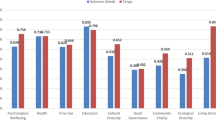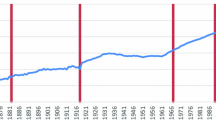Abstract
The Gross National Product (GNP) and the Gross National Happiness (GNH) are wellbeing indicators. The well-known GNP stresses on the importance of the national product or the rather objective wellbeing. While GNH, invented in 1972 in the small Buddhist Himalayan Kingdom of Bhutan, focuses on the broader concept of (national) happiness or the rather subjective wellbeing. Historically GNP developed as an indicator in a society in which avoiding the fear of not having enough to survive, was the priority. GNH in Bhutan was based on the target of developing our longing for happiness. And this notwithstanding the fact that in 1972 Bhutan still belonged to the world poorest countries. Philosophically one can connect these foundations of fear and happiness with analyses of Western philosophers like Hobbes (his Leviathan starts with the quote: “Fear and I are twins”). In Buddhist philosophy fear and happiness also are two crucial notions, expressed for instance by suffering and enlightenment. Methodologically this paper is based on the one hand on a literature study of philosophical thinkers who studied determinants of wellbeing and on the other hand on numerical data as published by the CBS, the Center for Bhutanese Studies and GNH Research on the occasion of the second measurement of the GNH in Bhutan in 2015. In the first two parts of the paper we concentrate on the wellbeing indicators GNP and GNH and their philosophical background. In the third part we discover what we can learn from the 2015 GNH Survey of Bhutan.
An earlier version of this chapter appeared in the Journal Society and Economy (May 2018).
Access this chapter
Tax calculation will be finalised at checkout
Purchases are for personal use only
Similar content being viewed by others
Notes
References
Abicht, L., and H. Opdebeeck. 2016. The point of philosophy, an introduction for the human sciences. Brussels: Peter Lang.
Bouckaert, L., H. Opdebeeck, and L. Zsolnai. 2008. Frugality: Rebalancing material and spiritual values in economic life. Oxford: Peter Lang.
Benioff, M., and K. Southwick. 2004. Compassionate capitalism, how corporations can make doing good an integral part of doing well. New York: Career Press.
Centre for Bhutan Studies & GNH Research. 2015. Provisional findings of 2015 GNH survey. Thimpu: Centre for Bhutan Studies & GNH Research.
Daniels, P. 2005. Economic systems and the Buddhist world view. Journal of Socio Economics 34 (2): 245–268.
Elkington, J. 2004. Enter the triple bottom line. In The triple bottom line: Does it all add up, ed. A. Henriques and J. Richardson. London: EarthScan.
Girard, R. 1978. Des choses caches depuis la fondation du monde. Paris: Grasset.
Hobbes, Th. [1651] 2013 Leviathan. Cambridge: Cambridge University Press.
Ims, K., and L. Pedersen. 2015. Business and the greater good, rethinking business in an age of crisis. Camberley: Edward Elgar Publishing.
Locke, J. [1690] 1982 Two treatises of government. London: Everyman’s Library.
Opdebeeck, H. 2010. Compassionate leadership as an expression of the common good. In Leadership and the common good, ed. H. de Bettignies and M. Thompson, 115–128. Antwerp: Garant.
———. 2013. Responsible economics. Oxford: Peter Lang.
———. 2015. The wisdom of mercy as the foundation of business and peace: The alternative to fear. In Business, ethics and peace, ed. L. Bouckaert, 63–74. Bingley: Emerald Group Publishing Limited.
Rona, P., and L. Zsolnai. 2017. Economics as a moral science. Cham: Springer.
Zsolnai, L. 2015. The spiritual dimension of business ethics and sustainability management. Cham: Springer.
Author information
Authors and Affiliations
Corresponding author
Editor information
Editors and Affiliations
Rights and permissions
Copyright information
© 2018 Springer International Publishing AG
About this chapter
Cite this chapter
Opdebeeck, H. (2018). What Can Sense Making Economies Learn from the GNH of Bhutan?. In: Bouckaert, L., Ims, K., Rona, P. (eds) Art, Spirituality and Economics. Virtues and Economics, vol 2. Springer, Cham. https://doi.org/10.1007/978-3-319-75064-4_17
Download citation
DOI: https://doi.org/10.1007/978-3-319-75064-4_17
Published:
Publisher Name: Springer, Cham
Print ISBN: 978-3-319-75063-7
Online ISBN: 978-3-319-75064-4
eBook Packages: Religion and PhilosophyPhilosophy and Religion (R0)




